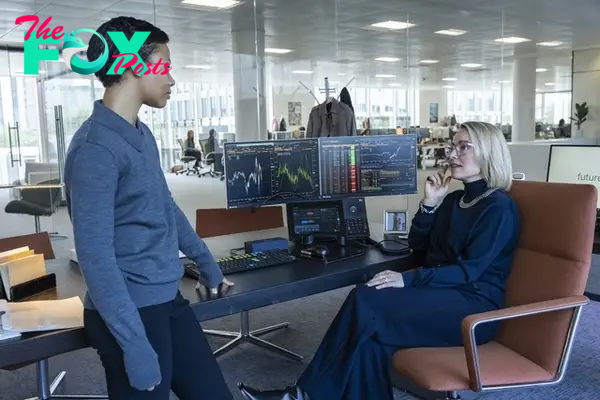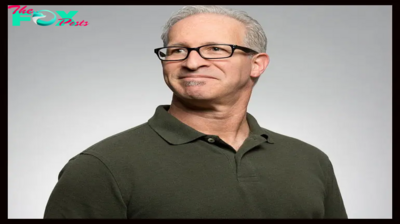Entertainment
Industry Season 3 Is a Searing Takedown of Socially Conscious Capitalism
People are our capital is the motto of Pierpoint & Co., the fictional finance giant at the center of the HBO drama Industry. At first glance, this is the kind of touchy-feely corporate propaganda that exists to convince employees the company cares about them and assure clients of its human touch. Look closer, though, and you might arrive at a more sinister—but also more literal—interpretation. Isn’t Pierpoint saying that human beings are nothing more than money, a mere resource for the multinational corporation to trade, manipulate, and exploit the same way it does the billions of dollars that flow through its investment banking and wealth management divisions?
The darkly ambiguous slogan mirrors the central coNFLict of the series’ third season, which premieres on Aug. 11. In its depiction of young strivers navigating the volatile markets and mercurial personalities that rule Pierpoint’s trading floor, the steamy, propulsive drama has never sugarcoated the brutality of finance. Nor has it minimized the lengths people will go to not just to make a buck, but to come out on top in an eternal power struggle that, if they have the “right” personality, will eventually take over their lives. But this time around, in Industry’s most thematically cohesive outing yet, creators Mickey Down and Konrad Kay have woven together each character’s storyline with a trenchant critique of capitalism that brands itself as benevolent.

We last saw the Pierpoint crew at the end of a slowly escalating tug-of-war between the ruthless upstart Harper Stern (Myha’la) and her mentor, Eric Tao (the great Ken Leung, never better than he is in Season 3), a Type A industry veteran in the midst of a midlife crisis. Eric had to decide whether he wanted to be a renegade, a family man, or a Pierpoint loyalist; he chose the latter. The upshot? Harper, who had been running her career like a confidence Game, got fired. When the new season opens, Eric is separated from his wife, on one hand, and, on the other, is celebrating his promotion to partner. Now, a titularly empowered Eric—the least powerful guy in the London office’s top boardroom—faces pressure to cut staff. Harper, meanwhile, reconnoiters in a lowly position at a fund going all-in on socially conscious investing while ingratiating herself with a brilliant, pragmatic colleague (Barry breakout Sarah Goldberg’s Petra) who is increasingly at odds with their boss.
To the extent that this ensemble drama had a protagonist in past seasons, it was Harper. But Season 3 more closely follows her friend and former co-worker Yasmin Kara-Hanani, played with a captivating mix of charm, jadedness, bratty entitlement, and poor-little-rich-girl vulnerability by Back to Black star Marisa Abela. It’s a smart storytelling decision. By now viewers understand that there is no limit to either Harper’s nerve or her ambition, and it’s hard to build suspense around a character who will always make the choice she thinks will put her at the greatest advantage, regardless of the consequences for the people naive enough to trust her.

Yaz’s personality, by contrast, has yet to ossify. Her narcissistic, abusive publishing mogul father Charles’ (Adam Levy) disappearance during a marathon Mediterranean yacht party that happened to coincide with legal troubles in the UK—and Yaz’s emergence as a tabloid target now that she’s back in London—put her in a fragile state as the season opens. Her position at Pierpoint, where she’s a nepotism hire who’s never exactly been a star employee, is far from secure, as executives fret over the press making “some ugly noise about embezzlement and a missing daddy.” One irony of holding her accountable for Charlie’s misdeeds is that she’s not even reaping the benefits of them anymore. He cut her off in the Season 2 finale.
Character development has always been more important to Industry than the intricacies of the financial-services issues that raise the stakes of those relationships. And that remains the case in Season 3. But Down and Kay’s choice of overarching Pierpoint plot feels more purposeful this time. The season opens on the eve of an IPO that Pierpoint has been managing for a green energy startup called Lumi. Yaz’s working-class boy toy Robert Spearing (Harry Lawtey) has been sent to Lumi HQ to babysit its hubristic founder, Henry Muck (Game of Thrones alum Kit Harington, in a slightly bland performance), an old-money dabbler who fancies himself a visionary. Like Harper’s new employer, Pierpoint has made big bets on what one ascendant female executive calls “our commitment to the green shift.” Buzzy terms like ESG and impact investing flood the boardroom. Never mind the warnings from politically incorrect old timers, as well as Machiavellians like Harper, that what they call “woke investing” or “greenwashing” is a passing fad—not to mention the creeping suspicion that Pierpoint has greatly overvalued Lumi.

The ESG plot raises a question that television, despite the current vogue for class-conscious, eat-the-rich shows, has rarely tackled head on: Is capitalism capable of enacting positive change for its own sake? Or is it a system that, by definition, values the bottom line over all other considerations, and thus will—not unlike Harper—always make the most selfish decision available? At the same time, individual characters are struggling with their own answers to a personal version of the same question: Is it possible for relationships in this fundamentally transactional industry to also be loving, caring, ethically and emotionally pure? Yaz finds herself in a love triangle with Rob, who genuinely adores her, and Henry, who has the money and iNFLuence to solve her scariest problems. Harper has to decide whether to use Yaz’s professional deficiencies for her own gain, despite knowing how much she’s hurting. A superior confides in Eric, who must choose what to do with a secret that might improve his position in the company.
Down and Kay are not what you might call bullish on the likelihood of human decency, on an intimate or industry-wide level, flourishing within a capitalist context. Sure, it’s nice when making money or advancing your own interests dovetails with doing the right thing for the people around you or the world at large. But when the financial sector and the people within it are forced to choose between selfishness and the greater good, Industry eloquently argues, selfishness must win out every time. Anyone who fails to treat people like capital is simply doing their job wrong.
-

 Entertainment4h ago
Entertainment4h agoAmerica On CoffeeWe’re simply inviting you to take a timeout into the rhythmic ambiance of our breakfast, brunch and/or espresso alternatives. We’re comfortable everytime you cease by.Vacation Espresso Cocktail
-

 Entertainment4h ago
Entertainment4h ago12 Methods to Command a Stage
-

 Entertainment5h ago
Entertainment5h agoBeyonce to Headline Halftime Show During NFL Christmas Game
-

 Entertainment6h ago
Entertainment6h agoDid You Correctly Answer This Poughkeepsie Related Jeopardy Question?
-

 Entertainment12h ago
Entertainment12h agoChanges Made in New York to “Men Working” Construction Signs
-

 Entertainment15h ago
Entertainment15h agoSuggestions for delivering a POWERFUL OPENING.
-

 Entertainment15h ago
Entertainment15h agoAmerica On CoffeeWe’re simply inviting you to take a timeout into the rhythmic ambiance of our breakfast, brunch and/or espresso picks. We’re completely happy everytime you cease by.BAD DREAMS – TEDDY SWIMS
-

 Entertainment20h ago
Entertainment20h agoRemembering Song Jae-rim: A Look at His Best Movies and K-Drama Performances

















